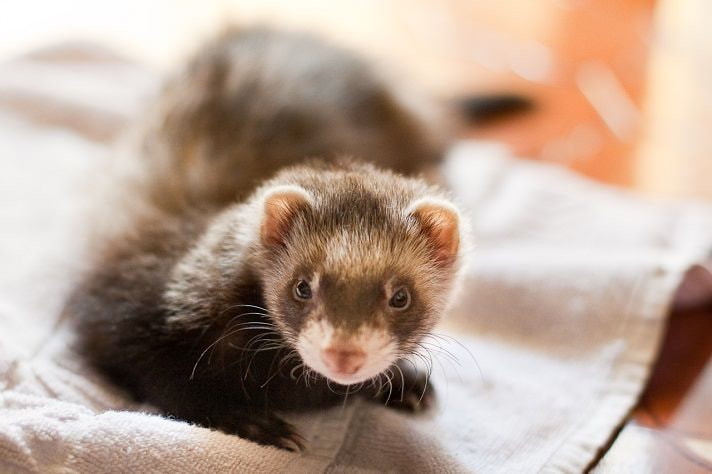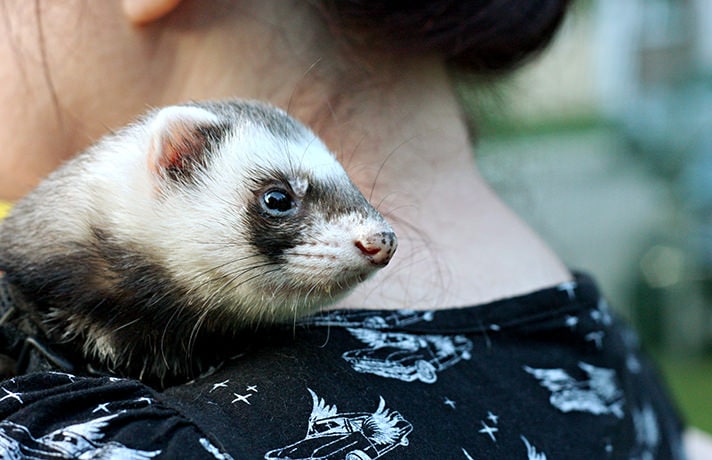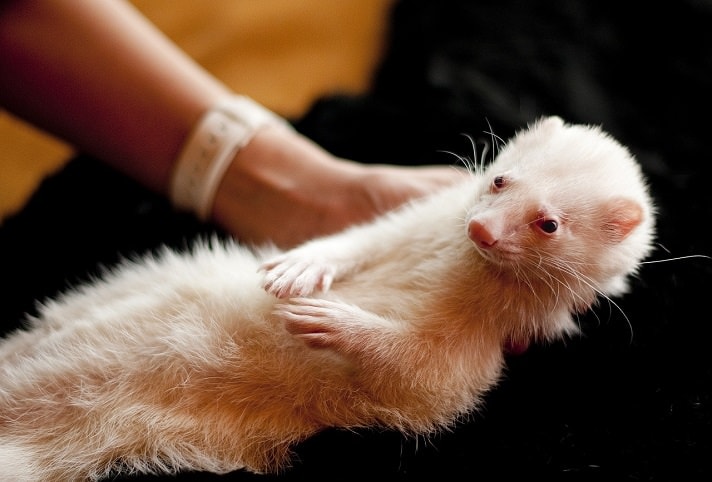One alert look from the intelligent, little bandit face of a ferret can entrance you. His lively curiosity, love of adventure, and unconcerned, comic clumsiness contribute to his considerable charm. A ferret plays throughout his life, offering you an endlessly amusing companion with a distinct personality and all sorts of individual quirks and odd habits. Their joy in life is infectious. Neither a slave, a master nor indifferent, a ferret is a friend. However, ferrets require a lot of work, including regular grooming and habitat cleaning. They need attention and can be pesky when they set their minds to something. Their inquisitive nature often leads them into trouble, so you must anticipate and constantly protect them from themselves. Making a mess is exciting for ferrets and litter box misses happen. If you value a spotless home, a ferret is not the pet for you. Read on to learn more about the advantages and disadvantages of owning a ferret.
1. Do They Bite?
Anything with teeth can, and will, bite if given a reason. Baby ferrets (kits) use their mouths when playing and as a way to explore the world. A ferret’s thick skin allows him to play rather roughly with other ferrets, but a well-handled, gently disciplined kit (baby ferret) learns that human skin must be mouthed. A bite will most likely occur if a ferret is frightened or hurt. Also, an animal that has been abused or neglected may bite very hard. However, I have never handled a ferret that did not almost completely stop biting once he learned to trust. Ferrets, being clever rascals, may use nipping to train their owners. If a nip on the ankle gets him the attention he seeks or a nip on the hand gets him put down, a ferret will continue this behavior. His owners have inadvertently taught the ferret to continue nipping. Learn ferret body language. Although it may look like a prelude to a ferocious attack, a ferret that bares his teeth and dances about is actually extending an invitation to play. While those sharp little canine teeth may seem dangerous, they are far less likely to inflict damage than a dog or cat bite.
2. Do They Stink?
All animals have a distinctive smell, including humans, and people react differently to scents. Several years ago a nice lady who performed cat rescue found a pair of ferrets in a park. We agreed to pick them up at her home. When we arrived, there were cats on the lawn. There were cats on the front porch. As you entered the house, there were cats on the stairway, peering down from the second floor, and milling under your feet. Her home was clean and tidy, but the sheer volume of animals gave off an eau du chat that could knock your socks off. As we entered her living room and saw the two little ferrets in a cage, the first thing she said to us was, “How can you stand their smell?” This story illustrates that you can become accustomed to one odor, but an unusual one may strike you as strong and foul.
Many people like the basic scent of a ferret, which strikes them as appealingly woodsy, but others find it appalling. It is standard practice to both alter (spay or neuter) and remove a ferret’s anal scent glands (de-scent) before offering her for sale. However, previous to the 1980s, ferrets were not regularly sold altered and de-scented, which lead to a pervasive opinion that ferrets “smell bad.” Males, in particular, give off a strong scent when they become sexually active. Spay/neuter surgery halts about 90 percent of a ferret’s natural odor. Ferrets that have not been de-scented retain the ability to “spray” when angry or frightened. It smells bad, but dissipates in minutes and does not cling like the spray of a skunk. Only people with a sensitive nose can tell the difference between a de-scented and unde-scented ferret under normal circumstances. Kits also smell more than adults, but that baby smell departs with age. A well-groomed and cared for ferret should not smell excessively.
If odor exists, try the following:
- Wash bedding weekly.
- Take the cage outside to clean, hose and disinfect it on a regular basis.
- Watch out for that ferret oil. The oil from a ferret’s fur rubs off on any porous surface she regularly touches. Wall-to-wall carpeting, fabric couches and chairs pick up this odor, even though the ferret herself smells fine.
- Stick to easily washable furniture and carpeting wherever the ferrets roam.
- A ferret’s ears may smell if they’re dirty. A bad tooth or gingivitis will produce foul mouth odor. Both situations should be treated by a veterinarian to make sure there is no infection. The vet can also teach you how to keep these important areas clean.
- A bath every month or so with a ferret-specific shampoo should keep body odors in check. However, be wary of bathing too frequently, because this can stimulate oil production and cause more odor.
- Cage: A cage should be made of wire with no more than a 1- by 2-inch space between bars (1 by 1 inch is preferable). A ferret with lots of out-of-cage time to play and explore can sleep in a cage only a few feet wide and high. Otherwise, bigger is better. If floors are wire, cover them with linoleum. Walking constantly on wire is uncomfortable and will eventually damage a ferret’s feet. Never house a ferret in an aquarium; it does not allow for adequate air circulation.
- Hammocks And Sleep Sacks: Ferrets love to lounge in hammocks, and sleep sacks offer them a warm haven that suits their natural instinct to hide. Keep at least two of each bedding item so you can switch off while one is in the wash. Regularly check for holes or tears that may develop, because these could cause injury if a ferret’s nail, toe or other body part gets caught.
- Carrier: A small pet carrier for trips to the vet or elsewhere is essential.
- Food Dish: Weighted crock-style dishes are the best because ferrets may play with them. One at least 6 inches across and 3 inches high is sufficient for one or two ferrets.
- Water Bottle/Bowl: The only water bottle I approve of for long-term use is glass and has a wide mouth, so it can be properly sanitized. Ceramic bowls are easy to clean and you can inspect them for cracks or chips in the glaze.
- Toys: Toys are an important part of your ferret’s layette. Never use latex toys, which are easily chewed and swallowed. I like human baby toys, which are manufactured to high standards and are washable. Be cautious. Some ferrets can play with a toy with small parts safely while others might rip it to shreds. Every time you wash toys, look them over for any signs of chewing or wear. If necessary, discard the toy and get a replacement.
3. Can They Be Litter Trained?
Unlike a cat, a ferret does not have a natural instinct to dig in dirt or sand to eliminate. With work, a ferret can be trained to use a litter box, but he won’t cover his feces and the box is often an irresistible toy. The natural instinct of a ferret when eliminating is to back into a corner. Place a litter box or a couple sheets of newspaper in corners of your pet’s living quarters. Place litter boxes and papers in any free-roam areas of your home to reinforce the habit when your ferret is out of the cage. Replace the litter spots daily. Expect the average ferret to use his litter spot about 90 percent of the time. If a ferret doesn’t use these spots, move the litter box or papers to the place he uses. If problems persist, change the type of litter box or litter. Some ferrets object to sharing a litter box, so that could be another cause of trouble.
4. What Do They Eat?
Dry kibble is the most popular choice. Constantly replenish the bowl. Look for a protein percentage of 35 percent or more, with the first ingredient being some form of meat, for example, chicken or a chicken by-product meal. Ferrets are carnivores and cannot metabolize the protein found in vegetables, such as cornmeal. Several good-quality, ferret-specific diets are now available. Some owners choose to feed premium kitten formulas of quality foods. Never feed a ferret dog food. Always make fresh water available. Discuss with your veterinarian the specific needs of your pet and how best to meet them. One important note about feeding ferrets — they can be finicky. A sudden change in diet might cause a hunger strike, which can be a problem if a type of food suddenly becomes unavailable. Because of this, many ferret owners feed a mixture of two or three kinds of ferret food to allow time for gradual introduction of a new food if an old one becomes unavailable.
5. What Kind Of Treats Can I Give Them?
Ferrets are carnivores and best suited to digesting meat, but this doesn’t stop them from begging for cookies, candy or soda. Keep sweets to a minimum and avoid caffeine. Never feed sweets to ferrets with certain medical conditions, such as insulinoma. A piece of cooked chicken or turkey is a great treat. You can occasionally offer a vegetable — a slice of raw potato or carrot — but make the piece small to avoid an intestinal blockage. Low sodium chicken broth or the drainings from a can of tuna are also fine. Ferrets love raisins, but dried fruit has a lot of sugar. Avoid these if possible. My ferrets enjoy a bit of watermelon, cantaloupe or the fresh juice from either.
If you like storable treats, consider unsweetened cereal. A tiny bit of sweets will not be harmful, but encourage healthier snacks. Some authorities state to avoid dairy products. However, a couple of licks of ice cream or a tiny cube of cheese as a very rare treat should not cause diarrhea. With any treat, moderation is always the key. A treat is a treat. It should not be a significant part of a pet’s daily diet. Keep in mind the small size of a ferret whenever you hand out snacks. Linatone or Ferratone are sold and used as treats, also, and they are invaluable as grooming bribes. However, moderation is important here, too. Both are loaded with vitamins and if your pet is already receiving sufficient vitamins through quality food, extra should not be necessary and too much could be dangerous.
6. Are They Good Pets?
You get out of a pet in equal proportion to what you give it. A well-handled, happy and trusting ferret can be a delightful companion. Because they produce little noise, they are convenient for apartment-dwellers, and the fact that their fur sheds less dander than a cat or dog causes less reactions for people with allergies. Besides the obvious necessities of food, water, housing and veterinary care, ferrets need several hours of out-of-cage time and interaction with their owners daily. Carefully evaluate your lifestyle and what you want from a pet before obtaining any animal. A “good” pet is the one that’s right for you and whose needs you can meet.
7. Are They Good With Kids?
Ferrets are best for older children. Most children under age 5 do not have the physical coordination to safely handle this fragile animal. Personalities also need to be considered. A loud, excitable child may frighten a ferret. A child who wants a pet that cuddles will be frustrated by an active ferret. Teens’ social lives may change radically from year to year, and they may soon head off for college, where pets are not allowed. In all cases, the entire family should be committed to caring for a ferret.
8. Do They Get Along With Other Pets?
Ferrets should never be allowed access to birds, small reptiles, rodents (mice, hamsters, etc.) or young rabbits, because these animals are a ferret’s natural prey. Larger bunnies may tolerate ferrets, but they must be supervised together. Cats occasionally will play with a ferret, but take care if your cat has intense hunting instincts that a ferret might trigger. In general, any dog bred originally for hunting could be dangerous to a ferret. Hounds, terriers and guard dogs may kill or injure with one snap. If you have a mixed breed with an unknown background, carefully supervise all early interactions to make sure the dog is comfortable with the ferret. Ferrets themselves are usually delighted to meet any cat or dog, so save them from their own curiosity. Always supervise any interactions between different species.
9. Is It Better To Have One Or Two?
Experts recommend that the best number to have is three. Ferret pairs may bond very closely and if one passes away, the survivor often becomes depressed. A third ferret can ease the loss. For those who have learned that they love and want ferrets in their lives, a three-ferret household allows you to break up your pets’ ages so you are less likely to be facing age-related vet expenses all at once. With this said, one ferret can survive alone with lots of human company.
10. What Regular Vet Care Do They Need?
Young ferrets should have an annual physical exam and annual canine distemper and rabies vaccinations. As a ferret ages, continue vaccinations and increase checkup frequency to semi-annually to catch any potential health problems at an early stage.
11. How Long Do They Live?
Ferrets live an average of 5 to 7 years. Good care can help extend their lives up to 8 or 9 years. Accidents or cancers can cut their lives much shorter.
12. What Kind Of Health Problems Do They Have?
No formal studies have been done, but various cancers seem to lead the list of ferret health problems (adrenal disease, insulinoma, lymphoma). Also of concern are dental disease, hairballs, gastric ulcers, ferret coronavirus (epizootic catarrhal enteritis) and Aleutian disease. Brush your ferret’s teeth, offer hairball remedy, reduce stress and limit both you and your ferret’s exposure to possible contagion to minimize the risks of your ferret suffering these noncancerous ailments. Also, ferrets can both catch and transmit the flu. Wash your hands before and after handling your pets and prevent interaction with anyone suffering from the flu to limit potential infection. Many people also take similar precautions when someone in the household has a cold. Your ferret may develop some significant illness by the time it reaches late middle age, at 4 to 5 years, so put aside money for veterinary expenses or consider obtaining veterinary insurance.
13. Are They Legal In My State?
Currently, the only states where ferrets are illegal to own are California and Hawaii. Ferrets may not be brought into Puerto Rico, a territory, either. There are two large cities where ferrets are not legal, Washington, DC, and New York City (including the five boroughs). Individual towns or counties may also ban ferrets. Check with the town hall or county seat to make sure. For the safety of your animal, do not bring ferrets into areas where they are prohibited. Regions heavily dependent upon agricultural revenues (California, Hawaii and Puerto Rico) have regular checkpoints where officials search for any import — plant or animal — that has been ruled dangerous to local species. At best, your pet will be turned back; at worst, confiscated.
14. Where Can You Get One?
Baby ferrets, already altered and de-scented, are available in pet stores that sell animals. Ferret breeders in various states are another option, but carefully check the breeder’s reputation and experience before you purchase a ferret. Breeders usually sell their kits unaltered and unde-scented. However, there are always older animals that have been given up by their owners for various reasons.
Some humane societies have begun to adopt out ferrets, or you can visit the Ferrets Shelters Directory website for a list of ferret shelters across the country. Each shelter has its own adoption policies and most require an interview. A ferret shelter is a good option for someone new to ferrets. A shelter works to find a good, committed home and will provide you loads of free care and behavior information. Even if there is no shelter in your area, you may see ads for ferrets seeking a new home in local newspapers or on pet store or vet office bulletin boards. For an owner with some knowledge, this is also a great way to help an animal in need. Ask for copies of medical records and try to obtain a commitment from the previous owner to take the ferret back if it does not work out. To protect yourself, you may wish to make the adoption conditional on a vet-check to be sure the ferret is in good health.
15. How Much Do They Cost?
A kit in a pet store usually costs between $100 and $150. Kits purchased from a breeder may cost far more, and you must factor in the cost of altering. Shelters vary from $40 to $100, but may reduce their prices for a pair that must stay together or animals that are older or with special needs. (Some shelters include a cage or other supplies in their fee.) You may find an owner willing to give their ferret free to a good home, but be sure to anticipate the cost of a vet checkup, also.
16. What Supplies Do They Need?
17. What Grooming Do They Need?
Ferrets should be groomed on a weekly or bi-weekly basis. They need their nails trimmed, their ears cleaned and a little pet toothpaste on a cotton swab to head off future dental problems. Add baths to this routine as needed. Perform these tasks during commercial breaks of a regularly watched TV show. That puts both you and the animal in a routine. This is also a good time to give your ferret a “mini-physical” and check for any unusual bumps, scrapes or discharges that may indicate a more serious medical problem.
18. How Much Time Do You Need To Spend With Them?
Ferrets are intelligent, social animals. While most people use cages, keeping a ferret caged 20-plus hours a day is unhealthy for her physically and emotionally. Interact with your pet daily. Nature inclines ferrets to be most active at dawn and dusk, but they can adjust their schedule to suit yours. An hour of free-roam time while you get ready for work or school, then several hours during the evening works fine. You don’t need to be directly playing with them while they’re out, but they will both enjoy and appreciate your company.
19. Are There Disadvantages To Owning A Ferret?
Ferrets do not live a long time and are susceptible to serious illnesses as they age. The expense — and the heartbreak — of losing them will occasionally deter previous owners from getting another. Some find their natural odor offensive, and some people think they look alarmingly like rats, although they are not rodents. A ferret will not romp with you in a field or play catch with a flying disk. It is completely devoid of a cat’s elegance and dignity, and only when older will a ferret sometimes agree to cuddle on your lap.
By: L. Vanessa Gruden
Featured Image: Via _guu_/Flickr
Share:










